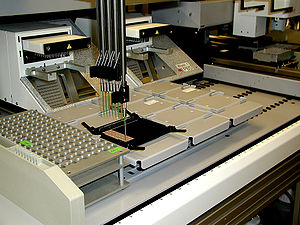
Back بروتيوميات Arabic প্রোটিনসমগ্র বিজ্ঞান Bengali/Bangla Proteomika BS Proteòmica Catalan پرۆتیۆمیک CKB Proteomika Czech Proteomics Danish Proteomik German Proteomiko Esperanto Proteómica Spanish

Proteomics is the large-scale study of proteins.[1][2] Proteins are vital parts of living organisms, with many functions such as the formation of structural fibers of muscle tissue, enzymatic digestion of food, or synthesis and replication of DNA. In addition, other kinds of proteins include antibodies that protect an organism from infection, and hormones that send important signals throughout the body.
The proteome is the entire set of proteins produced or modified by an organism or system. Proteomics enables the identification of ever-increasing numbers of proteins. This varies with time and distinct requirements, or stresses, that a cell or organism undergoes.[3]
Proteomics is an interdisciplinary domain that has benefited greatly from the genetic information of various genome projects, including the Human Genome Project.[4] It covers the exploration of proteomes from the overall level of protein composition, structure, and activity, and is an important component of functional genomics.
Proteomics generally denotes the large-scale experimental analysis of proteins and proteomes, but often refers specifically to protein purification and mass spectrometry. Indeed, mass spectrometry is the most powerful method for analysis of proteomes, both in large samples composed of millions of cells[5] and in single cells.[6][7]
- ^ Anderson NL, Anderson NG (August 1998). "Proteome and proteomics: new technologies, new concepts, and new words". Electrophoresis. 19 (11): 1853–1861. doi:10.1002/elps.1150191103. PMID 9740045. S2CID 28933890.
- ^ Blackstock WP, Weir MP (March 1999). "Proteomics: quantitative and physical mapping of cellular proteins". Trends in Biotechnology. 17 (3): 121–127. doi:10.1016/S0167-7799(98)01245-1. PMID 10189717.
- ^ Anderson JD, Johansson HJ, Graham CS, Vesterlund M, Pham MT, Bramlett CS, et al. (March 2016). "Comprehensive Proteomic Analysis of Mesenchymal Stem Cell Exosomes Reveals Modulation of Angiogenesis via Nuclear Factor-KappaB Signaling". Stem Cells. 34 (3): 601–613. doi:10.1002/stem.2298. PMC 5785927. PMID 26782178.
- ^ Hood L, Rowen L (2013-09-13). "The Human Genome Project: big science transforms biology and medicine". Genome Medicine. 5 (9): 79. doi:10.1186/gm483. PMC 4066586. PMID 24040834.
- ^ Zhang Y, Fonslow BR, Shan B, Baek MC, Yates JR (April 2013). "Protein analysis by shotgun/bottom-up proteomics". Chemical Reviews. 113 (4): 2343–2394. doi:10.1021/cr3003533. PMC 3751594. PMID 23438204.
- ^ Gatto L, Aebersold R, Cox J, Demichev V, Derks J, Emmott E, et al. (March 2023). "Initial recommendations for performing, benchmarking and reporting single-cell proteomics experiments". Nature Methods. 20 (3): 375–386. doi:10.1038/s41592-023-01785-3. PMC 10130941. PMID 36864200. S2CID 251018292.
- ^ Slavov N (February 2021). "Single-cell protein analysis by mass spectrometry". Current Opinion in Chemical Biology. Omics. 60: 1–9. doi:10.1016/j.cbpa.2020.04.018. PMC 7767890. PMID 32599342.
© MMXXIII Rich X Search. We shall prevail. All rights reserved. Rich X Search